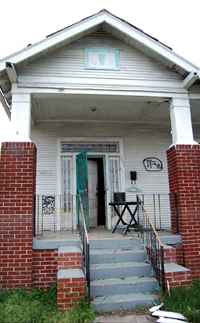Editor’s note: This is the last of a three-part series highlighting Loyola community members who hae been affected by Hurricane Katrina and its aftermath.
For viewers all over the world, the thousands of victims who gathered at the Superdome in the days after Katrina were a horrifying image on the television screen. For Carisa Smith, it was reality.
Born and raised in the St. Thomas housing project, Smith, now a housekeeper in Buddig Hall, moved to her home on St. Roch Street in the Eighth Ward five months before Hurricane Katrina.
“I loved my neighborhood,” she said. “My aunt Norma lived only two houses down. She lost everything, too. … It was safe, yes it was. The only scary moment I had was the storm.”
Smith, who lived with her husband, daughter and grandchild in a two-bedroom house, took pride in keeping her home neat.
“I love to clean. I kept my house clean. I also loved sitting on my porch, listening to my music, drink my beer … I really do miss it. It was a sweet neighborhood.”
Smith said she heard of Katrina on Aug. 21 but wasn’t told to evacuate until the day before the storm.
Although her daughter, Shondra, drove to Baton Rouge with a neighbor, Smith stayed behind with her husband Arthur, who was reluctant to leave.
“My daughter kept saying, ‘Mom, come on!’, my neighbor kept saying ‘Come on!’ … They got to Baton Rouge and then turned all the way back around,” she said.
By the time her daughter and neighbor returned to get Smith, it was too late.
“Traffic was backed up, and we didn’t have money for gas and all that.”
As Hurricane Katrina roared through New Orleans, the water that would eventually fill 80 percent of the city was already in her neighborhood.
“When I went to the window and looked out, the water had rose – it was over my car, and it came up to here,” she said, pointing to her chin.
When the water filled her home, Smith, along with her daughter, husband and neighbor, plunged into the storm to reach her cousin’s two-story house down the block.
“I was on my cousin’s neck with my other cousin holding my back, like this,” she said, wrapping her arms around her shoulders. “He said, ‘Cousin, hold on!’ and I said, ‘Lord Jesus, the wind’s taking me.'”
They joined about 15 people on the second floor of her cousin’s house to wait out the storm.
“I mean, it was scary. And the house was shaking, and all you could hear was the wind,” Smith said.
After the winds died down, her cousin’s husband crawled out of the window to a neighbor’s roof, waving a white T-shirt to attract one of the helicopters by then circling the city.
Smith looks away as she remembers the water that reached her chin.
“It was scary; it was black. When the boat people came and rescued us, we saw dead bodies,” she said, shuddering. “It gives me chills, even today.”
The boats deposited the group on the I-10 overpass at Esplanade Avenue, where ambulances were waiting to ferry survivors to the Superdome.
“There were 50 ambulances out there, and there must have been 30 of us in one ambulance,” Smith said, shaking her head.
The group was at the Superdome for five days; Smith doesn’t like to talk about this period.
“Oh, it was ridiculous …” she said. “There was fighting, raping. All you can do is lie on your little green thing or go stand outside.”
Smith credits her faith for getting her through the days.
“There was a little Mexican guy outside, and he prayed all day and all night, every minute, and asked people to pray with him, so I prayed a lot.”
Eventually, she and her family were relocated to San Antonio, where “they helped us beautifully.”
“They took us to San Antonio, Texas, and I thank the Lord for that. I was so grateful.”
In San Antonio, relief agencies gave her an apartment, food and clothes.
With saved money, she purchased a new car, and she and her husband returned to New Orleans two months after the storm. The first time she set foot on her street, she couldn’t bear to go inside her house.
“It was scary. Two months after the storm, they still hadn’t cleaned up the debris. Across the street, there was a house on top of a car. I told my husband, ‘please, let’s go,’ so we got back in the car and left.”
On her third visit back to New Orleans, she gathered the courage to go inside her house.
“It stinks, and everything was all over,” she said.
Smith and her family moved to a new apartment on the West Bank on Dec. 14. Her son Rondell told her that Loyola was hiring, and she applied and got a job as a housekeeper.
“I love it here. I love working here,” she said. “I love to clean; (the students) are very friendly, and I love (my coworkers).”
She said her days at the Superdome are still powerfully with her.
“I think about it a lot. I don’t tell my husband and them, but when it’s on the news, I think about it,” she said.
“It took a lot out of me, but it made me wise. When they call the storm, I’m going to leave.”
Kelly Brown can be reached at [email protected].








